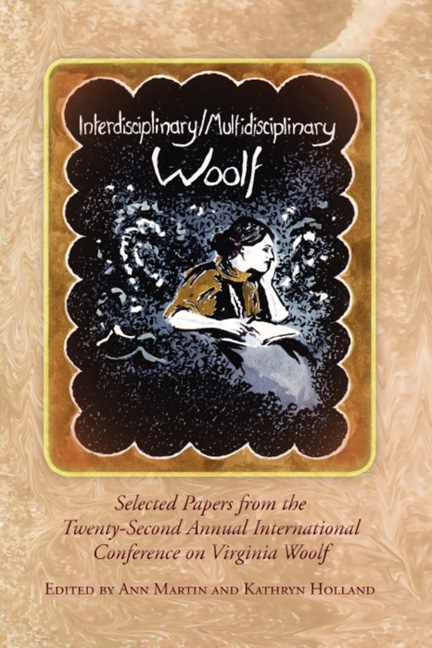Introduction to Interdisciplinary/Multidisciplinary Woolf
Summary
We have come together…to make one thing, not enduring—for what endures?— but seen by many eyes simultaneously. (TW 104)
Where James Ramsay comes to recognize that “nothing was simply one thing” (TTL 152), Bernard suggests that “one thing” can be made collectively while still seen differently. His valuation of “communion” (TW 103) as the basis for creation echoes the “collaboration” or consummation of difference that Woolf's speaker champions in A Room of One's Own (94). Multiple views—multiple Woolfs—exist simultaneously, but …where there is difference, there need not be division. Such was the motivation behind Interdisciplinary / Multidisciplinary Woolf—if not all Woolf conferences. As suggested by the wave image in Robin Adair's conference art, these collective moments draw together and tease apart varied perspectives on Woolf. Rather than interlocking pieces of a puzzle, our approaches overlap in combination—here, now, in Saskatoon, Vancouver, Glasgow, Chicago. Waves of place and time, Woolf conferences whiz us through art and scholarship from readers established and emerging, (un)common and academic, as we come together to create something new.
The theme of the 22nd Annual International Conference on Virginia Woolf was intended to signal the importance of discursive and methodological differences, as well as the points at which disciplines could be integrated and distinctions could be questioned. While the terms themselves overlap, interdisciplinarity has become associated with the “interaction” or combination of different fields and methods (Lattuca 1-2), where multi disciplinarity implies a “juxtaposition” of disciplinary approaches regarding a common issue (Klein). Both invoke the “discriminating apparatus that distinguishes one research agenda from another,” or the codes and practices that differentiate one profession from its fellows (Caughie 6). Both terms also suggest collaboration and thus crossing (out) of bounds, responding to disparate traditions and influences, turning unfamiliar corners, and voyaging into recharted territory. Less a transformation of Woolf or modernist studies— a formidable task, as Andrew Thacker points out, “given the institutional structures that govern the production of disciplinary knowledge” (609)—our Woolf Conference takes part in a continuing and active engagement with the real, the edited, the miscellaneous, the urban, the international, and the natural world, as we move through varied and variable disciplines.
- Type
- Chapter
- Information
- Interdisciplinary/Multidisciplinary Woolf , pp. vii - xiiiPublisher: Liverpool University PressPrint publication year: 2013



